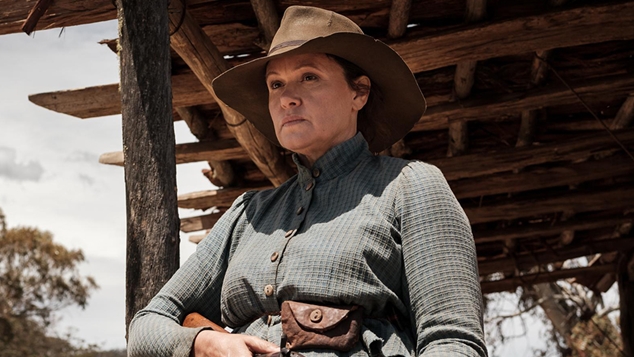
The Drover’s Wife: The Legend of Molly Johnson | Dir: Leah Purcell | ★ ★ ★ ★
“The two-roomed house is built of round timber, slabs, and stringy-bark, and floored with split slabs … Nineteen miles to the nearest sign of civilization – a shanty on the main road. The drover, an ex-squatter, is away with sheep. His wife and children are left here alone. Four ragged, dried-up-looking children are playing about the house.”
So begins Henry Lawson’s short story that was first published in 1892 and read by almost every school kid since. It is a powerful story of a woman defending her children against a dangerous intruder in the form of a snake, with her eldest son eager to join her for his first kill although he was only twelve.
Locating the story to the picturesque Snowy Mountains, writer/director Leah Purcell value-adds to the story by incorporating issues of race, prejudice, domestic violence and gender inequality to the issues of survival and resilience in the western reaches of the relatively new colony.
Heavily pregnant Molly Johnson (Leah Purcell) sends her children to be cared for in the town while she awaits the birth in the remote homestead. With her husband still away droving, she points her rifle at an intruder “I’ll shoot you where you stand and I’ll bury you where you fall”.
However, Yadaka (Rob Collins), an Aboriginal man on the run from the colonial authorities after being accused of murder, is no threat and he ends up helping Molly. Yadaka is a ‘story keeper’ and he is able to share knowledge with Molly that gives her strength to guide her children to take a different path.
At that time, Women’s Suffrage was fighting for the right to vote in many cities around the world with New Zealand giving women the right to vote and be elected to parliament in 1893, but these concerns were far from Molly’s world.
Purcell’s reinterpretation that women would be able to defend the Molly Johnsons of their world was a bit jarring as the concept that domestic violence was anything but domestic did not emerge in Australia until the 1980s … and only legally recognised in 2006. Fortunately, Purcell’s extremely powerful performance carries the reinterpreted outback western tale of survival.
Lezly Herbert
You can support our work by subscribing to our Patreon
or contributing to our GoFundMe campaign.






